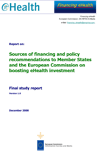 The Financing eHealth study was commissioned by DG INFSO and Media's ICT for Health Unit. The aim is to assess different financing opportunities against the financing needs of eHealth investment. The overriding goal of the study, and of this final report, is to assist Member States and the European Commission (EC) in their efforts to meet the eHealth Action Plan objective of "supporting and boosting investment in eHealth".
The Financing eHealth study was commissioned by DG INFSO and Media's ICT for Health Unit. The aim is to assess different financing opportunities against the financing needs of eHealth investment. The overriding goal of the study, and of this final report, is to assist Member States and the European Commission (EC) in their efforts to meet the eHealth Action Plan objective of "supporting and boosting investment in eHealth". A sobering conclusion of the study is that just increasing finance for eHealth will not necessarily boost investment. How much to spend is the wrong question and conveys an inappropriate perspective. What to spend the money spent on is a better question. The most important part of eHealth investment that needs expanding is the eHealth skills and knowledge of healthcare staff and ICT suppliers' staff. An expanded capability is essential to achieve more success and so help to boost eHealth investment.
Increased capability helps to secure the potential and confidence that eHealth will add enough value. If an investment is worth it, providing the required finance becomes a supporting priority. Denying finance for eHealth is the right decision where the planned investment does not show a better net benefit than other types of competing investment. Choosing the best financing arrangement is a challenge for eHealth investors. A common theme seems to be the difficulty in integrating eHealth financing into the factors that ensure success. Over-emphasising finance for ICT to the detriment of engagement, change, and benefits realisation may be prevalent, and needs correcting.
No single source of financing is enough to initiate an eHealth investment and see it through to its completion. Mixed financing arrangements are a solution to handle such investments at all stages of their lifecycle. This applies to both recurring and nonrecurring costs. Joint financing for recurring costs is a model in which all beneficiaries have to be involved in the financing stage. Current financing opportunities support a limited, and often insufficient, time-period of the investment lifecycle. Therefore a combination of sources is suitable to support an investment, and its characteristics determine the finance mix. Often, different models of eHealth financing need combining to procure such investments.
Download Sources of Financing and Policy Recommendations to Member States and the European Commission on Boosting eHealth Investment Final study report (.pdf, 847 KB).
Download from the eHealthNews.EU Portal's mirror: Sources of Financing and Policy Recommendations to Member States and the European Commission on Boosting eHealth Investment Final study report (.pdf, 847 KB).
For further information, please visit:
http://www.financing-ehealth.eu
Related news articles:
- empirica's Profile
About empirica
empirica Gesellschaft für Kommunikations- und Technologieforschung mbH (empirica) has many years of experience in quantitative and qualitative research methods. Its clients are private companies and public bodies: large and medium-sized companies in the insurance, pharmaceutical and automobile industries as well as software developers and hardware manufacturers. There are also telecommunications service companies and network providers, social services firms, medical facilities, Federal and State Government ministries in Germany and the European Commission as well as the European statistical office (Eurostat). For further information, please visit www.empirica.com.
About Financing eHealth study
The Financing eHealth study was commissioned by DG INFSO and Media, unit ICT for Health, with the aim to assess different financing opportunities against the financing needs of eHealth investment. The overriding goal is to provide assistance to Member States and the European Commission in their efforts to meet the eHealth Action Plan objective of "supporting and boosting investment in eHealth".
The study focuses on providing insights and specific recommendations on:
- developing the supply side of eHealth finance to optimise the use of resources available for boosting investment in eHealth, including ways to add value through collaboration between Member States;
- effective and efficient management of eHealth investment to support health services providers, i.e. the demand side.
These recommendations aim to help close the gap between supply of and demand for eHealth financing, and thus support Member States and the European Commission in their activities.
For further information, please visit http://www.financing-ehealth.eu.